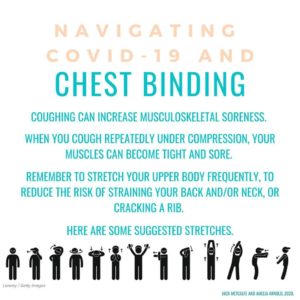COVID-19 is making a huge and extraordinary impact on all our lives including of course this research project. We will put out information soon about our plans for interviews.
In the meantime, we wanted to draw attention to precautions which are being recommended in the trans community for trans (including non-binary) people who bind. (We are not medically trained and cannot give medical advice but we pass on this information in case it is helpful.)
Information about binding and COVID-19 may be particularly important if you have asthma or a respiratory illness as you are at higher risk of complications.
All of these tips have been put together by Jack Metcalfe and Amelia Arnold, and the full post can be found here.
If you have a persistent cough, wearing a binder can make it harder to cough and breathe fully. If you can, avoid wearing your binder in this time. If this does not feel possible for you, consider:
- Using a worn-in binder or wearing a larger size if you have one.
- Wearing tight singlets or shirts in place of a binder.
- Taking regular breaks from binding, and spend 1 minute taking deep breathes.
By breathing more fully, it prevents a build-up of fluid in the lungs, and reduces risk of other infections and complications taking hold. Coughing can also help to clear your lungs and loosen your upper body after binding, so be sure to do this once you have taken your binder off. When coughing, try to keep your back straight, and avoid twisting, as this will help to prevent injury to your muscles.
There are also some suggested stretches which you should do frequently to help reduce back and neck strain.

Lastly, we want to acknowledge the importance of combatting loneliness whilst isolating. Trans people are more likely to experience mental health issues like depression due to the discrimination and barriers we face in day-to-day life just for being who we are. If you are feeling more depressed, anxious or just feel like you need someone to talk to about your mental health, there are a variety of helpline services on our website which you can access (see here). And if you have a friend or family member who you think is struggling, reach out to them with a phone call, text message or some other means to let them know you are there.
